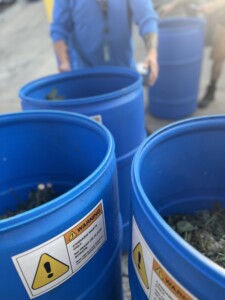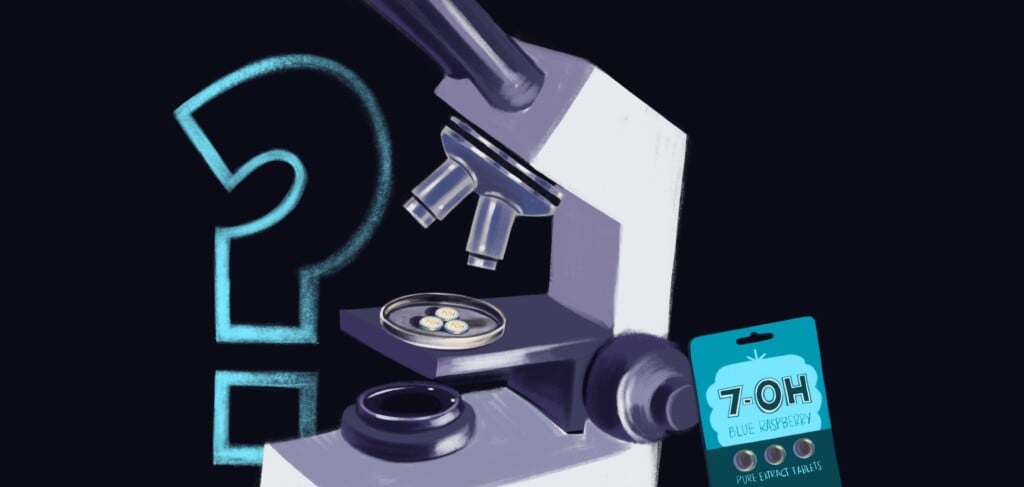Smoke Show: How Monarch Waste Co. is sustainably managing MO’s cannabis waste
When we purchase products, we typically don’t think about the end result: the waste. As awareness has risen over time, individuals have become more cautious about how they dispose of the remains of the respective product. And while recycling and composting have trended upward, there are still plenty of ways to continue to drive the movement and push for a greener planet.
When it comes to cannabis waste management, Zach McCullough and Annie Macheca saw a gap in Missouri’s industry and decided to take action. After being added to the large group of individuals who have been denied licenses to operate cannabis facilities, the two still managed to find their niche in the market when they founded their company, Monarch Waste Co., in 2021, during the medicinal years of cannabis in MO.
Monarch Waste Co. is Missouri’s first and only mobile cannabis waste management company, spearheading sustainable practices to dispose of materials across the entire state’s market.
“When we realized that medical cannabis was going to be on the docket here in Missouri, and also having been a cannabis user for a long time prior to that, it just felt super exciting,” McCullough says.
The husband and wife duo met while they were both attending Prescott College in Arizona—McCullough studied adventure education while Macheca studied food journalism and agroecology. Eventually, the two found themselves in St. Louis, Macheca’s hometown, operating their own urban farm. The two would sell their produce at local farmers markets and restaurants, which were some of their earliest days working as entrepreneurs.
Since her parents were entrepreneurs, Macheca learned a thing or two about how to run a business with your significant other. While McCullough’s daily role keeps his boots on the ground, Macheca handles much of the long-term, big-picture priorities.
“As far as being a couple in business together, I think that maybe that isn’t a good partnership for all people, but Zach and I are actually—I think we’re opposite,” Macheca says. “So where he has strengths, I have weaknesses, and vice versa, and that really works out and balances us very well.”
Not only did the business-center mindset transition from their family farm to Monarch, but some of the skills that the two obtained from their experiences at Prescott and working in the weeds of their own land have transitioned into how they operate their business.
“I think that there are definitely similarities between our farm business and Monarch, in the sense that there are lots of logistics and hustle,” McCullough says. “Farming, you’re constantly problem-solving, dealing with the weather, equipment, the timing of getting seeds in the ground, just these general things. I think that translates very directly into the day-to-day challenges of running a statewide cannabis waste business.”
“Nature wants to do its own thing, and by urban farming, you have to fight all these different things at once,” Macheca says. “I think that there’s a parallel between that and the emerging industry of cannabis in not only Missouri, but our country. We’re constantly having to evolve and change to fit into the regulations of our state and even what the federal government says about cannabis.”
When it comes to managing cannabis waste, like anything in the weed biz, McCullough and Macheca are quick to inform that it is no easy task. Compliance remains a clear-cut priority in order to remain within the state’s regulations.
“There are lots of check boxes when it comes to waste. So, staying compliant as far as what we offer, it’s not just about checking these regulatory boxes; It’s about building systems and specifically waste SOPs (Standard Operating Procedures) that are practical for license holders to follow and for Monarch to execute on a recurring basis,” McCullough says.
Not only is hitting all the compliance requirements a strenuous process in its own right, but the actual work of composting this material gets pretty messy, Macheca says. The team finds themselves deeply entrenched in compost “sludge” that can “seep into your skin” and carries an unwarranted smell. These unattractive features of the tasks make Monarch’s services even more desirable for facilities, since they can avoid getting their hands dirty and rather keep them sticky.
“Our hands are dirty, but our mission at Monarch is clean,” Macheca says.
McCullough says that Monarch Waste Co. typically services multiple cannabis facilities in a day’s span, from cultivations, manufacturers, testing sites, and dispensaries. One of those facilities is St. Louis-based cannabis company CAMP Cannabis.
Monarch has serviced the company’s cannabis and cultivation facility since the early medicinal days in the state. Monarch has collaborated with CAMP to design a space in the facility that allows for easy access to the waste so that the company is in and out. CAMP Cannabis COO and Co-Founder Jennifer McGuire says that Monarch’s team is efficient and easy to work with, usually able to complete the typical job within an hour or two.
“Our entry into the facility is right by the loading dock, so they’ve got a bigger box truck and this rendering machine in it that grinds everything up,” she says. “They just dump the blue bins into them.”
McGuire says that not only are the services that Monarch provides efficient, but they also take pride in partnering with a company that prioritizes being environmentally-friendly.
“I think that environmental aspect, because they’ve got an urban farm that’s in the city, and just everything that they’ve done—their ideas on just really trying to create better environments, greener environments, healthier environments for everyone is so notable,” she says.
McGuire touches on the fact that many of the standard business practices in the MO cannabis industry have a negative effect that sometimes go unseen on our environment. Mylar packaging and the copious amounts of water and electricity used to function these facilities are just a few of the aspects of the market that truly put a dent in the state’s environment. So it made partnering with Monarch an easy decision.
“Sustainability is key,” McGuire says. “We keep seeing the news every day that there’s more and more damage that humans are doing to the earth. If there’s something that we do that isn’t going to disrupt our operations and it’s something we can feel good about, we’re definitely going to do it.”
On top of all of that, she says that McCullough and Macheca are just good people overall, commending how they handled transitioning into the cannabis industry on an uncharted path.
“I just think that they’re really wonderful people,” she says. “They really wanted to get into the cannabis space, and they did apply, but they didn’t get the licenses. And so rather than being really salty about it, they made lemonade instead, and they created this company that tries to offset some of the environmental challenges that we put out into the world by growing cannabis.”
But CAMP Cannabis is just one of many facilities that Monarch services—The company works in 30 cities throughout the entire state. As the only company in Missouri spearheading sustainable waste solutions among the cannabis industry, and cannabis facilities spread out among the eight congressional districts in the state, the team takes on some serious travel to service different locations. With that in mind, the company recently expanded to the Kansas City area, having just serviced Nuthera’s manufacturing and cultivation site.
“It’s been very exciting,” McCullough says. “I would say it’s still a smaller part of our business. We tend to do a little bit more business closer to home, but as we continue to build infrastructure at Monarch, we are trying to make it easier and quicker to service our Kansas City clients.”
With no primary location in the metro, the team has to travel from St. Louis in order to provide its services. Larger operations can take a few days to tackle, so the team is hopeful to get a facility within Kansas City soon to reduce the time wasted from the four-hour drive across the state.
Along with the regular services that Monarch provides, the team found another way to make an impact on maintaining a safe and cleaner Earth here in the Show-Me State. The company has recently partnered with local dispensaries for its Disposable Vape Recycling Program.
All-in-one vapes have grown in popularity during the last several years, which, in turn, has created an issue as far as sustaining environmentally-friendly practices goes. These vapes are made with lithium-ion batteries, which are large fire hazards in landfills and can release toxic materials into the Earth.
“We call them disposable vape pens, but they’re not really disposable. You’re not supposed to throw a lithium-ion battery in the trash. But at the same time, how is a consumer supposed to separate the battery on their own and take it somewhere for recycling?” McCullough asks.
To better manage the disposal of these products, Monarch’s newly launched initiative incentivizes consumers to bring their used vapes back to the participating dispensaries in order to receive a small discount on their next purchase. The dispensary then hands the used product off to Monarch, where they effectively separate the batteries from the rest of the vape pen and responsibly recycle the material, reducing greenhouse gas emissions, conserving resources, and preserving minerals.
“When we talk to people on the ground about this, I haven’t met anybody who doesn’t feel like this is an important matter,” McCullough says. “The world has increased the amount of lithium batteries it uses, it would seem. I think there’s still a little catching up to do. Once that product is considered waste, a whole set of different rules are applied to it, and we haven’t quite caught up with, ‘How are we properly disposing of this?’”
Monarch has a page on its website for dispensaries to sign up for the program and partner with the company to take a stance on the issue. McCullough also encourages consumers to urge their local dispensaries to get on board if they have not already done so.
The two are quick to point out that educating the everyday individual is the key first step to creating this change.
“What we can do and what we can control is, let’s get as much education out as possible, and let’s get resources for people to bring their AIOs back for us to collect them and then recycle them, and know that those are a valuable resource that’s not just getting wasted,” McCullough says.
“Consumers are the last link in the chain,” Macheca says. “They have the power in their hands, so if we can educate people, if we can continue to go to events and collect all-in-ones, if we can put signs in dispensaries, if we can promote this on social media, we can help people understand that they’re protecting the environment, they’re supporting public safety, and they’re helping build a cleaner cannabis industry overall by taking these steps with us.
The work that Monarch Waste Co. provides to our market is crucial and should not go unnoticed. The meticulous processes that the family-run business provides are unseen, so it is easy for the everyday individual to never consider.
“What most people don’t realize is how regulated cannabis waste is or how much of it there is. Everything from expired edibles or edibles that have been put on admin hold, any type of consumer packaging you can think of, the amount of depackaging that is sometimes required on a bulk pickup before we can actually process the waste,” McCullough says.
Considering the company is the only one of its kind providing this service and doing it in an ethical manner, cannabis brands across the state have been seen partnering with the family-run business.
“We’re not here to point fingers at the cannabis industry or any specific facility, but I think we all can understand at this point that the cannabis industry has plenty of room for creating more sustainable systems that are also easier to adopt,” McCullough says.
Macheca says that she and the company are proud of the fact that they provide a key service to the developing market in an ecologically-friendly fashion.
“We take pride in it because we’re not just moving waste from point A to point B,” she says. “It allows us to feel like we’re creating a real impact. Every pound we handle represents a facility staying compliant, harmful materials kept out of landfills, and really a step towards a more responsible industry.”
Obviously, the team at Monarch is passionate about being the one and only avenue for sustainable cannabis waste management in the state, and the ability to partner with countless faces across the trade is something that McCullough does not take for granted, either.
“I think that’s really what I value the most about our work—I get to meet and talk to so many cool people on so many different levels, from boots on the ground, to owners, to corporate, and I think just being able to have our excellent customer support and help people with their waste problems, we get to just be in the mix,” McCullough says.
It has been a long road for McCullough and Macheca to get where they are with Monarch Waste Co. After the denial of their applications to run a cannabis facility, they made the most of the rejection and still managed to find their way into the market in a small cranny of what keeps the industry operating.
“I just want to live my life and know that I left the world a slightly better place, that my impact on people left a smile on their face, that I created a business that wasn’t taking, but instead was giving,” Macheca says.
More information on Monarch’s services and its Disposable Vape Recycling Program can be found on the company’s website at https://www.monarchwaste.co/
Click below to read the August 2025 Issue of The Pitch Magazine:










